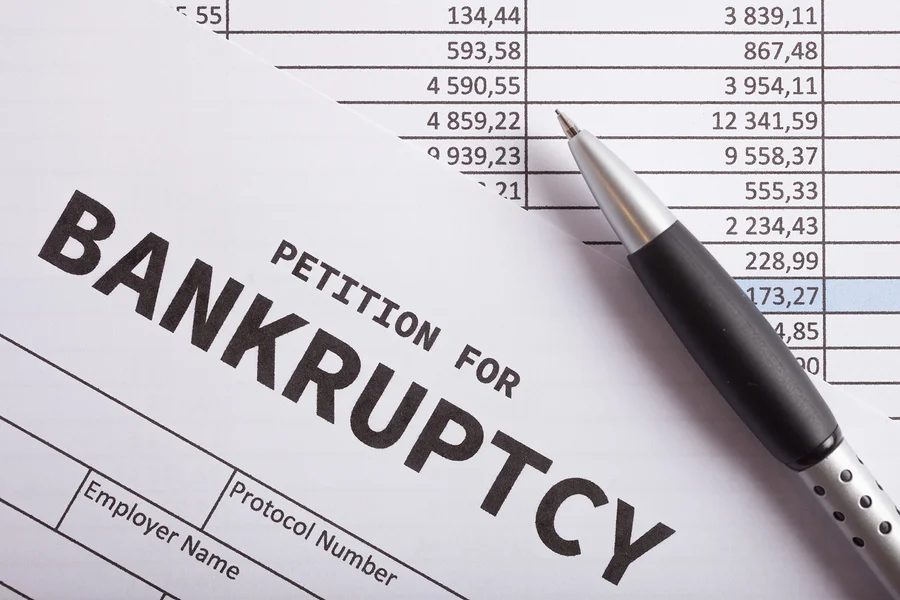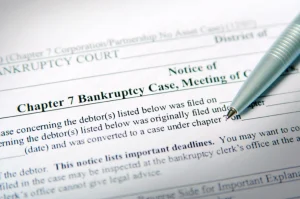Who is eligible to file for Chapter 13 bankruptcy?
Chapter 13 bankruptcy is reserved for couples and individuals rather than partnerships and corporations. It’s the 13th Chapter of the U.S. Bankruptcy Code (11 U.S. Code Title 11) which is why it’s the title Chapter 13 bankruptcy. You’re probably eligible, provided you’ve had credit counseling and a steady income that can cover your expenses of living.
In addition your secured debt should be less than $1,257.850 and your non-secured debt must not exceed $419,275. If you have filed an bankruptcy petition that was deemed to be invalid or for abuse during the last half-year, you are not able to apply until after the 180-day waiting time has ended.

How does Chapter 13 bankruptcy work?
Your lawyer and you will file all the required documents, such as the petition, the declaration of your financial situation, schedules, and the plan of restructuring.
You’ll be charged a number of fees and could even have meetings with creditors, however your lawyer will manage the majority of aspects. If you intend to make a claim yourself be aware of the rate of failure is very high.
In the majority of instances it is recommended to work with a qualified bankruptcy attorney. Once your paperwork has been submitted the documents will be scrutinized by the Chapter 13 trustee and creditors. Then, you’ll start the repayment process.
Rather than discharging debts as Chapter 7 bankruptcy, Chapter 13 bankruptcy creates a multi-year repayment plan. You’re provided with a monthly amount that is based on your disposable income and financial obligations.
The money is then divided among your creditors who qualify as unsecured. Then, you have between three and five years to settle your debts. If you are able to successfully complete the Chapter 13 repayment plan, your debts will be completely paid off.
The whole process usually will take between three and five years of planned payment which are then utilized to adjust your debt. Certain debts aren’t eligible for discharge, such as Federal student loan debt.
What are my obligations under Chapter 13 bankruptcy?
Starting April 1st 2019 when you file for Chapter 13, expect a certain amount of requirements to keep your eligibility. For instance, you must:
- Make sure you file all tax returns required prior to your creditor’s meeting
- Notify all creditors of your bankruptcy
- Make sure you keep your child support and alimony payments in your plan
- Make all your payments to the trustee during your adjustment period.
- Make all the payments agreed on secured loans, including your home and vehicles
- Meet tax obligations for new tax years and not take on significant new consumer debt
- The trustee should be provided with annual tax returns as well as information about changes in income
- Get approval from the court for any new loan or for purchasing, selling or refinancing a house
- Not more than $419,275 in unsecure debts
- Not more than $1,257,850 in secured debts (including car loans and mortgages)
What’s a bankruptcy trustee, and what exactly is their role?
The trustee is an agent of the estate in bankruptcy that works with the bankruptcy court as well as the federal government to look over bankruptcy petitions and schedules.
The trustee is usually the person who handles the majority of the issues relating to the approval and processing of bankruptcy claims. The trustee also serves as the agent who distributes your money and is responsible for providing supervision on any issues that may arise.

What is the role of my lawyer?
When filing for Chapter 13 bankruptcy, your bankruptcy lawyer generally reviews every aspect of your case and then prepares your estate plan, allowing you to retain all of your assets as you can. They will collect all of your data and information and will handle your court papers and deadlines.
Your attorney will draft the petition, schedules and the necessary statements for bankruptcy filing. They will also write your reorganization plan and assist you in understanding your responsibilities. They will also visit with creditors, appear at hearings, and discuss any concerns to the trustee.
Additionally, attorneys will submit necessary amendments and petitions should you have to alter the terms of your Chapter 13 plan. The attorneys are more responsible for errors and other issues that may arise in the Chapter 13 case.
This means that a large portion of the burdens that bankruptcy imposes are lifted off you and fall to the responsibility of the attorney.
Attorney’s fees differ between states, but expect to pay between $1,200 to $2,500. Given the responsibility they take on behalf of you, it’s worth the cost.
How does Chapter 13 bankruptcy affect my credit?
Chapter 13 bankruptcy will be publically listed on your credit report for a period of 7 years and during that time your credit score will be adversely affected.
However your credit score will gradually increase once you establish positive payment patterns during the adjustment period and will continue to rise as long as you stay on track on your repayments.
There is also the possibility of an increase in difficulty in getting credit. If you’re able to get a loan or credit card you’ll be charged one of the most expensive rates of interest available.
You’ll also be able only to get smaller credit limits, so it’s crucial to accumulate cash reserves in case of the event of financial emergency that might come up.
What are the exemptions in Chapter 13 bankruptcy?
In Chapter 7, every state has an exemptions list for items that don’t have to be sold in order to make payments to creditors.
In general there is a monetary limit for each type of property you own, regardless of whether it’s your car, home or household items. If you file a Chapter 7, your creditors are entitled to liquidate assets that are not covered under this exemptions list.
However when you file Chapter 13, instead of having these items liquidated you must pay the full amount to creditors as part of the plan for adjustment. To fully comprehend the way exemptions apply to your particular situation and state, it’s beneficial to speak with an attorney.
What if I am self-employed or a business owner?
If you’re a self-employed, or operate your own business you must submit a monthly financial statement or business operating report with the trustee prior to the 15th day of every month.
You’ll also need to confirm your income prior to filing for Chapter 13 bankruptcy. If you run your own company, it’s more important to keep a detailed record of your financials before as well as during Chapter 13 bankruptcy.

What if I can’t continue to make all my payments?
If you find yourself in a situation under Chapter 13 in which you’re in a position to not make all the monthly obligations you must prove that it’s due to a significant change in your income or a needless expense. Your lawyer is then required to submit a moratorium application to the bankruptcy court as well as the creditors and is subject to the trustee’s approval.
In the majority of Chapter 13 cases, you are likely to be approved for a catch-up plan that includes extending the repayment period in the event of an unexpected financial setback.
If you have a problem that is long-term you can request an amendment. If you face a major hardship that makes it difficult for you to pay the Chapter 13 payments, you could apply for a hardship exemption.
Another alternative is to change your bankruptcy into one that is a Chapter 7 and have your remaining debts that are eligible to be dissolved. This is only possible if your current financial situation is in line with the income requirements to qualify for Chapter 7 bankruptcy.
The final alternative is to revoke the current Chapter 13 and file for another one. Be sure to get an automatic stay from the court so that that creditors aren’t able to collect when you transition to the new bankruptcy strategy.
Should I apply for Chapter 13 bankruptcy?
There is no correct or incorrect solution to this issue. One of the first steps should be to seek out complimentary credit counseling in order to determine whether you can come up with an affordable debt repayment program that fits your particular situation. If not, seek out legal assistance from a professional.
It’s a great idea to research about the pros and negatives of bankruptcy however in the end, much is dependent on your individual situation. From your financial situation to your health, there are numerous tiny details that can affect the decision to choose the right method of action.




